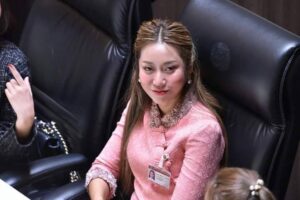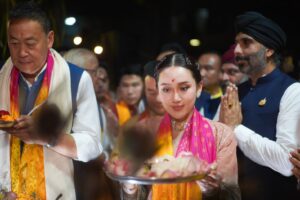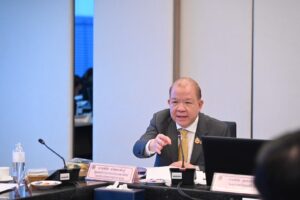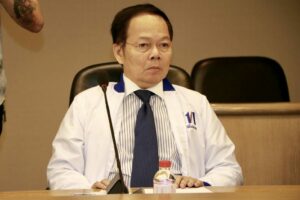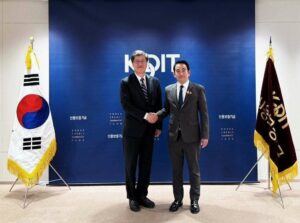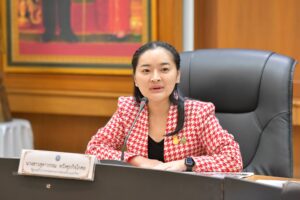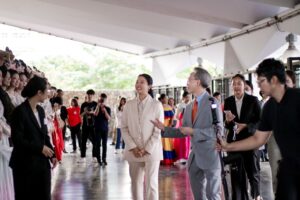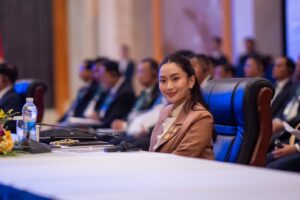Assessment of Thailand’sState of Affairs 2015
Assessment of
Thailand’sState of Affairs
2015:
The nation still faces problems and challenges in
every dimension.
Resolving national problems cannot be successful
if there is a lack of understanding and inaccurately
analysis of the problems.
As the year 2015
is drawing to a close Thailand still faces domestic and international
challenges in multiple dimensions. Thai
people must pay attention as it directly impacts everyone’s lives.
Pheu Thai Party,
as a key political party of the country has closely followed the administration of the present Government and is profoundly
aware of the issues and deems it appropriate to summarize the State of Affairs
of 2015 so that everyone has a clear picture, and Thai people may be able to
make constructive criticisms and comments should any shortcomings in the
administration of the Government be found, for the overall benefit of the
nation.
Pheu Thai Party summarizes
the State of Affairs of Thailand in 2015 as follows:
1)
Suppressing
corruption – the public asks for sincerity in resolving the problem
Past coup d’états usually cite corruption by the Government as the
primary reason for seizing power and target political parties as the cause
of the problems while ignoring other groups, and overlooking any honest efforts
that had been made in resolving corruption issues.
The present Government also followed the same path. The policy to seriously
root out corruption was declared since the beginning of its administration,
with the Head of the NCPO presiding as the Chairperson of the National
Anti-Corruption Board and had announced many policies and measures to suppress
corruption. However, the Government must subsequently clarify to the public
its sincerity in implementing these policies.
Ever since this Government commenced its administration, news of
corruption involving the Government has surfaced starting from the questionable
purchase of microphones in the Cabinet Meeting Room, which is the most
expensive in the world (each costing 140,000 baht), but the Government claimed
that the contract has not yet been signed. Furthermore, news had emerged of the
Government Spokesperson, at the time, getting numerous public relations jobs from
various government agencies and also getting a job for the “Blue Flag Project
to reduce expenses of the people”. Moreover, there was news of a company that
sub-contracted the project “Returning Happiness to Nonthaburi Province” in 2014
for a budget as high as 10 million baht. The Company had certain ministers in
the Government as directors who subsequently resigned from the company when
this was found. These three cases were not inspected thoroughly enough by the
agencies responsible. Irregularities were also found in the project to allocate
5 million baht for each Tambon (sub-district). Most recently, the suspicion concerning
the corruption allegations of Rajabhakti Park Project, which is considered very
important because Gen Udomdej Sitabutr had acknowledged that in casting the 7
statues of past Thai Kings, commissions (kickbacks) were demanded from the foundries,
but this money has already been donated to the Foundation. This ran in contrary
to the findings by the Army that such claims could not be substantiated. This
matter has been widely criticized by the public, which eventually made the
Anti-Corruption agencies re-examine the matter, but so far no conclusion has
yet been made. Presently, the suspicion of the public is continually increasing
and has reached the point where many have begun seeking for the answer by
themselves. However, people that wanted to conduct such investigations were obstructed,
and many have been arrested and prosecuted for charges that are harsher than
what they had done.
It
was also revealed to the public that there were cases of individuals receiving
salaries for more than one post and appointing their family members as
advisors. This posed not only as moral challenges but also exploited tax money
of the people, and caused the State to waste considerable budget.
This
Government is considered to have absolute power that is unchecked, or can be
checked but with extreme difficulties. It also has Article 44 in the
Temporary Constitution 2014 which has been exercised several times, such as
issuing orders to prohibit any litigation against committee members and
officials involved in the Rice Pledging Scheme, which is granting amnesty in
advance for the officials involved in the sale of the rice
stockpile.
Thus, the desire to see this
Government suppress corruption in a just and transparent manner has become
questionable, and the public has to keep following up and investigating these
issues despite running into numerous difficulties.
2)
The economy is in a downturn without
expectations of improvement any time soon… The Government does not understand,
or lack the ability to resolve the problems.
For the past year, the effort by the
Government to address economic issues did not turn out as it had anticipated. Money
in the people’s pocket have dwindled, and snatch thief, stealing and robbery
have alarmingly skyrocketed. Thai economy suffers from the slowest growth in
ASEAN, lower than Laos and Cambodia, while tax collection is below target, and
the stock market index has hit an all-time low. The Government finally had
to reshuffle the entire economic team, but currently, things have not improved.
This has caused people in every strata of society to experience hardship, with those
with less income, such as farmers, laborers andthose that
must strive for daily sustenance being hit the hardest. This is because every
engine in the economy has stalled.
· Export, which is
critical and comprises of 70% of GDP, has contracted by over 5% which is
very severe, with future outlook not very promising. This is because the
European Union has withdrawn GSP for Thailand which bars any free trade
negotiations with the EU because Thailand is not democratic. Apart from this,
Thailand faces increased trade obstacles, which is further exacerbated by the
current slump in the world economy.
· Shrinking foreign investment because
investors do not want to take risks due to increasing trade barriers. There are
also various forms of human rights violations, such as detaining people for
“attitude adjustment” and the arrest of students and people. This, paradoxically,
included conducting investigations to litigate foreign ambassadors, which in
effect, destroys the trust of partner nations and overseas investors. The
decline in investment will soon cause further exports slump, especially
investments in hi-technology which has already moved to neighboring countries,
like Vietnam.
·
Low domestic
consumption because
people lack income. Prices of agricultural produce have declined, small and medium
sized business (SMEs) face losses, and large numbers have already shut down.
Tourism only has quantity but lack quality because tourists with high income avoid
visiting the country due to the prevailing unfavorable political situation.
·
Government
spending is not effectiveand is plagued by delays with only those
projects initiated by the previous Government that are seeing some progress.
·
The projected economic growth of 3% came from a very
low base with negative inflation. Also, imports declined because no one is
making additional investments. If this situation continues, the national
economy will be faced with terrible difficulties which will ultimately, drastically
affect the people.
· Grassroots economy is in a slump and the
people are facing a crisis, due to shallow government policies giving the poor,
the farmers, the peasants and the laborers no way out
o
Grassroots
economy is the economy of the people which supports the livelihood of the
majority in the nation. For the past year, since seizing power from the
democratic Government, the administration by the present Government has halted
the flow of money. “People with money do not dare to spend, the poor or the
majority that want to spend have no money”. The majority of the people saw
their income dwindle, many lost their work or suffered skyrocketing debts.
Businesses, especially middle and small enterprises, are becoming
bankrupt. Farmers face declining income which impact the
survival of their families with no way out.
o
The
key reason is because the Government lacks policies and appropriate measures to
support the price of agricultural produce and did not correctly address the
issue of drought/famine. In actual fact, the ongoing drought/famine could have
been averted had the 350 billion baht been invested in the Water Management
Project initiated by Pheu Thai Party. This project was the beacon of hope for
farmers and peasants nationwide. Had the project commenced then, by today its
progress would already have exceeded 50% and this drought/famine, which is
causing such hardships would not have occurred.
o
The
economy is devoid of solutions due to the lack of creative policies that value
the farmers. This Government is biased in its accusations and withdrawal of the
Rice Pledging Scheme which was a government policy initiated by the Government
of Prime Minister Yingluck. The policy was meant to look after agricultural
produce and support grassroots economy, while raising the quality of life for
farmers, which is in accordance with the intent of the Constitution, and similar
to other public projects for the people. Every farmer was guaranteed the price
of their produce which help raised their level of income, while also becoming
an important part that help invigorate the economy. The withdrawal of the Rice
Pledging Scheme by the current Government, without offering any other
alternative policies, have resulted in the lives of farmers being ignored and
left to fend for themselves. The price of agricultural produce has since
then declined drastically, for example rubber and other agricultural crops.
o
Apart from problems with the dwindling income of
farmers, business owners and entrepreneurs nationwide also suffer from loss and
closure. This numbered more than 14,000 cases in the first 10 months of 2015
which has increased by 19%, and in October 2015 the number of businesses
closing down increased by 33%. This reflected the state of the national
economy in a steep downturn, which directly impacted laborers and
entrepreneurs. These signs point to the national economy that is in the
doldrums, without a way out, reflecting on mismanagement and failure in resolving
economic issues that resulted from looking at problems with a biased view and
is inconsistent with the actual facts.
To restore trust and opportunity and convert
it into capital for resolving national economic woes, the country must gain
acceptance by speedily returning democracy, and jointly collaborate with all
parties, and enable the people to become primary participants in solving problems
and decide their own future.
3)
Problems of serious human rights
violation, discrimination and being under international scrutiny.
Since the overthrow of the 2007
Constitution which guaranteed Thai people the rights, liberty and dignity of
human beings, the rights and liberties of people have been severely diminished,
especially
when the exercise of such rights and liberties affect the stability of the Government
and the NCPO. Individuals intending to exercise their rights and liberties to
examine corruption allegations and the working of the Government or the NCPO or
any of its personnel, are not only ordered to desist, threatened and obstructed,
but also risk being prosecuted by the law and also face threats outside the law,
which may bring afflictions to themselves, their relatives and associates.
Even though the Temporary Constitution
established Article 4 to protect the dignity of human beings, the rights,
liberties and equality, but in Article 44 the Head of NCPO has the legal and
constitutional power to limit and violate the rights and liberties of
individuals to any extent. In other words, “Might is Right” which becomes a
hindrance for any reconciliation.
The use of Article 44 and other Articles
which may be, or may not be, supported by law have widely violated and
limited the rights and liberties of people, academics, students, journalists
and politicians in many forms, even though the exercise of such rights and
liberties usually never affect national security. Political gathering of
more than 5 people is prohibited, and civilians accused of violating security
or NCPO announcements or orders are court-marshalled. Any gatherings, meetings
or academic forums held, even in academic institutions, must receive prior
approval from the Army. Those who made symbolic displays of their disagreement
against the coup d’état would be arrested and taken for “attitude adjustment”.
The media must be careful not to feature any information that may affect the
Government or the NCPO; otherwise, it would risk various means of retaliation.
Politicians, academics and people who were detained for “attitude adjustment”
would be threatened or barred from conducting financial transactions should
they express opinions that displease those in power. Numerous people were stalked
and must report themselves to the SecurityUnits periodically.
The latest case is the incident when the students and people who demanded the
investigation into the transparency concerning the construction of Rajabhakti
Park were detained. Presently, there
appears to be no judicial or independent agencies that is able to protect the
people from such frequent violation of their rights and liberties.
Such situation of human rights violation
in Thailand is a return to the past when the leaders were undemocratic, even
though the Government itself proclaimed that the situation of the nation has
returned to normal. This is another issue that the Government must speedily
find internationally acceptable approaches to reduce tension.
4)
Trust is on the decline, international
community awaits the return of democracy
The lack of
acceptance from other nations that adhere to Democratic Rule could be seen from
the number of visits by leaders at the national levels that have stalled or
declined. Agreements that have been made during bilateral meetings between
national leaders are affected as the result. Collaborations and relationships
in various matters have been downgraded. Trust in the Government has been
affected which inevitably impacts trade and investment. This has been evident
each time leaders in the Government attend meetings on theworld
stage being consistently asked by leaders from other countries, and also by the
UN Secretary General, when elections will be held, and sovereignty be returned
to the Thai people. The opportunity for bilateral discussions with other democratic
world leaders also seem to have noticeably decreased.
More importantly,
the limiting of the liberties and depriving the rights of people to express
themselves and the violation of basic human rights of Thai people have been
consistently challenged by many international human rights organizations, calling
the Government to abstain and speedily revoke its actions that violate the
rights and liberties of the people. Other nations still see many issues indicating
that Thailand does not observe the Rule of Law and lack measures to protect and
preserve the rights and liberties of Thai people. It also lacks humanitarian
considerations towards human trafficking and the smuggling of refugees to
Thailand, such as the case of Uighurs and the trafficking of Rohingya people.
The administration of the nation after the
coup d’état has impacted foreign affairs forcing Thailand to halt free trade
negotiation with the EU after the coup (while Vietnam has already entered into such
agreement). Thailand was not selected and lost its seat in the United Nations
Human Rights Council. Thailand was degraded from TIER 2 to TIER 3 due to human
trafficking and human rights violation of labor. Thailand is undergoing
stringent scrutiny by the EU for the use of questionable fishing equipment, and
the watch level may be raised from yellow to red card. Thailand was withdrawn
its GSP privileges for certain Thai products exported to the US, and the level
of assistance in various areas has also been downgraded.
Furthermore, the approach taken by
the Government concerning foreign affairs often disregard international
principles. For example, the incident concerning the US Ambassador, UK
Ambassador and also the Foreign Correspondents’ Club of Thailand which drew
international criticism of Thailand in terms of international principles and
violating the rights of the individual to express their opinions.
In the future, this will result
in the administration of the Government facing more difficulties, lack of
cooperation and the partner nations, who are democratic, may issue measures to
mount further pressure, which will inevitably impact the overall Thai economy
and the livelihood of the people.
5)
Drafting of the
Constitution that lacks faith in the people and confuses democratic principles
is leading the country towards conflictthat has no
resolution in sight.
Thailand used to be the leader and the hope
of democracy in the region. We have offered neighboring countries assistance in
drafting their constitutions, but today a country like Thailand, that has the most
constitutions in the world, is facing difficulties in drafting a new
constitution.
A good constitution that is acceptable
to the people must be based on a foundation that is drawn from democratic
principles which acknowledges and respects the decisions of the people who are
the true owner of the sovereign power. It
must foster the rights and liberties of the people, respect human rights,
adhere to the Rule of Law, establish organizational structures that exercise
sovereign power appropriately, maintaining balance andlinks
with the people. The use of legislative, executive and judicial powers must be
effective with appropriate system to keep check, and must be accountable and responsible.
Moreover, the constitution drafting process should involve the people and the
various sectors of society as much as possible.
However, when one considers the draft
charter by the Constitutional Drafting Committee which was previously dismissed
by theNational Reform Council and the new charter being
prepared by the second Constitutional Drafting Committee,the
concept runs contrary to the mentioned principles. The contents do not abide by
democratic principles and open a leeway for “external” powers. This includes adopting
a new MP electoral system when the previous system is already good; opening the
way for a Prime Minister who is not an MP (unelected); selecting the senate by
appointment instead of being elected by the people; the independent and
auditing organizations has no link to the power of the people. There are also
no mechanisms to reform the judicial and independent organizations, which created
division in the society concerning issues of double standards. A special
organization is also established as another layer to control the working of the
government, which has never been practiced in any other countries. The drafting
of the Constitution grants boundless power without any checks to the
independent and judicial organizations, which debilitates
the executive power. This in turn weakens the administration of the nation coercing
inefficiency, as the government must spend most of its time addressing
political problems, rather than the problems of the nation and the people.
The drafters of the Constitution thus should be aware that
the new constitution must not become the cause of conflict, but instead bring
reconciliation and harmony among the people of the nation. They should believe
that the democratic process, in accordance with the provision of the constitution, can resolve the problems of the nation,
without the need of having other special organizations. Obstacles of democratic
development for these past 83 years have been caused by certain groups of
people who have not been willing to put up or accept the rules
of democracy and the constitution, nor accept election results which were the
decisions of the majority. They regard themselves pertinent to resolve problems
when they should have allowed the system to address itself.
The Constitution Drafting
Committee and NCPO cannot deny their responsibility should this charter, which is
being drafted, fail the referendum because it knows which kind of content the
people will reject, as it does not follow democratic principles. The NCPO
should also amend the temporary constitution to clarify its approach should
this draft constitution fail the referendum to avert a constitutional crisis
that would aggravate the present economic situation, and subsequently, bring
about a national crisis.
6)
Various aspects of
reform are stilladrift: reconciliation is still not tangible; social issues is piling
up waiting to unravel.
One
of the excuses in seizing power this time is to reform and bring reconciliation,
which actually should jointly come from the participation of everyone in the
society and not from the coup d’état. Almost two years have passed, and so far,
no tangible reform or reconciliation has taken shape. On the contrary, there has
been many incidents that, instead, inhibits reconciliation and harmony, such as
judicial processes that are of double standards;the use
of special powers to transfer government officials believed to have close ties
with the past government which destroys the morale of government officials
nationwide; the accusations and mudslingingto discredit the
former leader and government; showing disdain and accusation against policies
by the former government. However, there is no denying that past policies were
successful and beneficial, such as the 30 Baht Universal Health Care Scheme; One
Tambol One Product (OTOP); 1-million-baht Village Fund; Construction of underground
train and mass transit system etc.
After
the coup d’état, the NCPO and the Government established the National Reform
Council (NRC) which was assigned with the task to take care and develop the
country. However, almost 2 years have passed, and so far, there has been no
tangible progress in reforming important issues making it difficult to expect
any reform to succeed in the remaining timeframe according to the NCPO roadmap.
The Government still does not
understand that the process of reform must proceed hand in hand with actual
work that must be consistently adapted to the state of the problem that
unfolds. The Government had to use absolute power in Article 44 to resolve
almost every problem that it presumes it understands, while the NRC, that
consists of several hundred members, has appropriately not fulfilled its duties
and wasted considerable budget. If the NRC were effective in its role, problems
such as being given the red flag by the International Civil Aviation
Organization (ICAO) and being banned from flying into the United States would
not have occurred.
This
Government has lost the opportunity to implement good policies to resolve
problems because it is ensnared by the word “populism”,
only deeming populist policies, such as Rice Pledging Scheme; First Car Scheme accusing
them to be political strategies to spend State money to gain administrative power
of the country. Such accusations lack understanding in the philosophy behind
the schemes and the details of the problems the people face. More importantly, it
avoids mentioning the 30-Baht Universal Health Care Scheme; SML; SME; and 1-million-baht
Village Fund Scheme, which were considered populist policies but were
successful and generally accepted by the people.
Apart
from what has been mentioned, the failure to tackle economic issues has brought
destitute and poverty to the people which resulted in numerous social problems,
such as crime, gambling, domestic violence, the collapse of the family unit,
and the loss of opportunities for the poor and under privileged in Thai
society.
To summarize, it
can be seen that reform is afloat and intangible, and the hope to see success
by the Government and the NCPO in the remaining time has turned out to be an
empty hope that cannot be realized any time soon.
Finally, Pheu
Thai Party hopes that these 6 key points summarized herein would be considered
by those involved to ponder and review the approach to resolve problems to
bring the most benefit to the nation and the people.
“If problems are
not discerned accurately, resolving such problems and finding solutions for the
nation cannot ensue, but will instead exacerbate and create new problems in the
future”
Pheu Thai Party
22 December 2015.
:
The nation still faces problems and challenges in
every dimension.
Resolving national problems cannot be successful
if there is a lack of understanding and inaccurately
analysis of the problems.
As the year 2015
is drawing to a close Thailand still faces domestic and international
challenges in multiple dimensions. Thai
people must pay attention as it directly impacts everyone’s lives.
Pheu Thai Party,
as a key political party of the country has closely followed the administration of the present Government and is profoundly
aware of the issues and deems it appropriate to summarize the State of Affairs
of 2015 so that everyone has a clear picture, and Thai people may be able to
make constructive criticisms and comments should any shortcomings in the
administration of the Government be found, for the overall benefit of the
nation.
Pheu Thai Party summarizes
the State of Affairs of Thailand in 2015 as follows:
1)
Suppressing
corruption – the public asks for sincerity in resolving the problem
Past coup d’états usually cite corruption by the Government as the
primary reason for seizing power and target political parties as the cause
of the problems while ignoring other groups, and overlooking any honest efforts
that had been made in resolving corruption issues.
The present Government also followed the same path. The policy to seriously
root out corruption was declared since the beginning of its administration,
with the Head of the NCPO presiding as the Chairperson of the National
Anti-Corruption Board and had announced many policies and measures to suppress
corruption. However, the Government must subsequently clarify to the public
its sincerity in implementing these policies.
Ever since this Government commenced its administration, news of
corruption involving the Government has surfaced starting from the questionable
purchase of microphones in the Cabinet Meeting Room, which is the most
expensive in the world (each costing 140,000 baht), but the Government claimed
that the contract has not yet been signed. Furthermore, news had emerged of the
Government Spokesperson, at the time, getting numerous public relations jobs from
various government agencies and also getting a job for the “Blue Flag Project
to reduce expenses of the people”. Moreover, there was news of a company that
sub-contracted the project “Returning Happiness to Nonthaburi Province” in 2014
for a budget as high as 10 million baht. The Company had certain ministers in
the Government as directors who subsequently resigned from the company when
this was found. These three cases were not inspected thoroughly enough by the
agencies responsible. Irregularities were also found in the project to allocate
5 million baht for each Tambon (sub-district). Most recently, the suspicion concerning
the corruption allegations of Rajabhakti Park Project, which is considered very
important because Gen Udomdej Sitabutr had acknowledged that in casting the 7
statues of past Thai Kings, commissions (kickbacks) were demanded from the foundries,
but this money has already been donated to the Foundation. This ran in contrary
to the findings by the Army that such claims could not be substantiated. This
matter has been widely criticized by the public, which eventually made the
Anti-Corruption agencies re-examine the matter, but so far no conclusion has
yet been made. Presently, the suspicion of the public is continually increasing
and has reached the point where many have begun seeking for the answer by
themselves. However, people that wanted to conduct such investigations were obstructed,
and many have been arrested and prosecuted for charges that are harsher than
what they had done.
It
was also revealed to the public that there were cases of individuals receiving
salaries for more than one post and appointing their family members as
advisors. This posed not only as moral challenges but also exploited tax money
of the people, and caused the State to waste considerable budget.
This
Government is considered to have absolute power that is unchecked, or can be
checked but with extreme difficulties. It also has Article 44 in the
Temporary Constitution 2014 which has been exercised several times, such as
issuing orders to prohibit any litigation against committee members and
officials involved in the Rice Pledging Scheme, which is granting amnesty in
advance for the officials involved in the sale of the rice
stockpile.
Thus, the desire to see this
Government suppress corruption in a just and transparent manner has become
questionable, and the public has to keep following up and investigating these
issues despite running into numerous difficulties.
2)
The economy is in a downturn without
expectations of improvement any time soon… The Government does not understand,
or lack the ability to resolve the problems.
For the past year, the effort by the
Government to address economic issues did not turn out as it had anticipated. Money
in the people’s pocket have dwindled, and snatch thief, stealing and robbery
have alarmingly skyrocketed. Thai economy suffers from the slowest growth in
ASEAN, lower than Laos and Cambodia, while tax collection is below target, and
the stock market index has hit an all-time low. The Government finally had
to reshuffle the entire economic team, but currently, things have not improved.
This has caused people in every strata of society to experience hardship, with those
with less income, such as farmers, laborers andthose that
must strive for daily sustenance being hit the hardest. This is because every
engine in the economy has stalled.
· Export, which is
critical and comprises of 70% of GDP, has contracted by over 5% which is
very severe, with future outlook not very promising. This is because the
European Union has withdrawn GSP for Thailand which bars any free trade
negotiations with the EU because Thailand is not democratic. Apart from this,
Thailand faces increased trade obstacles, which is further exacerbated by the
current slump in the world economy.
· Shrinking foreign investment because
investors do not want to take risks due to increasing trade barriers. There are
also various forms of human rights violations, such as detaining people for
“attitude adjustment” and the arrest of students and people. This, paradoxically,
included conducting investigations to litigate foreign ambassadors, which in
effect, destroys the trust of partner nations and overseas investors. The
decline in investment will soon cause further exports slump, especially
investments in hi-technology which has already moved to neighboring countries,
like Vietnam.
·
Low domestic
consumption because
people lack income. Prices of agricultural produce have declined, small and medium
sized business (SMEs) face losses, and large numbers have already shut down.
Tourism only has quantity but lack quality because tourists with high income avoid
visiting the country due to the prevailing unfavorable political situation.
·
Government
spending is not effectiveand is plagued by delays with only those
projects initiated by the previous Government that are seeing some progress.
·
The projected economic growth of 3% came from a very
low base with negative inflation. Also, imports declined because no one is
making additional investments. If this situation continues, the national
economy will be faced with terrible difficulties which will ultimately, drastically
affect the people.
· Grassroots economy is in a slump and the
people are facing a crisis, due to shallow government policies giving the poor,
the farmers, the peasants and the laborers no way out
o
Grassroots
economy is the economy of the people which supports the livelihood of the
majority in the nation. For the past year, since seizing power from the
democratic Government, the administration by the present Government has halted
the flow of money. “People with money do not dare to spend, the poor or the
majority that want to spend have no money”. The majority of the people saw
their income dwindle, many lost their work or suffered skyrocketing debts.
Businesses, especially middle and small enterprises, are becoming
bankrupt. Farmers face declining income which impact the
survival of their families with no way out.
o
The
key reason is because the Government lacks policies and appropriate measures to
support the price of agricultural produce and did not correctly address the
issue of drought/famine. In actual fact, the ongoing drought/famine could have
been averted had the 350 billion baht been invested in the Water Management
Project initiated by Pheu Thai Party. This project was the beacon of hope for
farmers and peasants nationwide. Had the project commenced then, by today its
progress would already have exceeded 50% and this drought/famine, which is
causing such hardships would not have occurred.
o
The
economy is devoid of solutions due to the lack of creative policies that value
the farmers. This Government is biased in its accusations and withdrawal of the
Rice Pledging Scheme which was a government policy initiated by the Government
of Prime Minister Yingluck. The policy was meant to look after agricultural
produce and support grassroots economy, while raising the quality of life for
farmers, which is in accordance with the intent of the Constitution, and similar
to other public projects for the people. Every farmer was guaranteed the price
of their produce which help raised their level of income, while also becoming
an important part that help invigorate the economy. The withdrawal of the Rice
Pledging Scheme by the current Government, without offering any other
alternative policies, have resulted in the lives of farmers being ignored and
left to fend for themselves. The price of agricultural produce has since
then declined drastically, for example rubber and other agricultural crops.
o
Apart from problems with the dwindling income of
farmers, business owners and entrepreneurs nationwide also suffer from loss and
closure. This numbered more than 14,000 cases in the first 10 months of 2015
which has increased by 19%, and in October 2015 the number of businesses
closing down increased by 33%. This reflected the state of the national
economy in a steep downturn, which directly impacted laborers and
entrepreneurs. These signs point to the national economy that is in the
doldrums, without a way out, reflecting on mismanagement and failure in resolving
economic issues that resulted from looking at problems with a biased view and
is inconsistent with the actual facts.
To restore trust and opportunity and convert
it into capital for resolving national economic woes, the country must gain
acceptance by speedily returning democracy, and jointly collaborate with all
parties, and enable the people to become primary participants in solving problems
and decide their own future.
3)
Problems of serious human rights
violation, discrimination and being under international scrutiny.
Since the overthrow of the 2007
Constitution which guaranteed Thai people the rights, liberty and dignity of
human beings, the rights and liberties of people have been severely diminished,
especially
when the exercise of such rights and liberties affect the stability of the Government
and the NCPO. Individuals intending to exercise their rights and liberties to
examine corruption allegations and the working of the Government or the NCPO or
any of its personnel, are not only ordered to desist, threatened and obstructed,
but also risk being prosecuted by the law and also face threats outside the law,
which may bring afflictions to themselves, their relatives and associates.
Even though the Temporary Constitution
established Article 4 to protect the dignity of human beings, the rights,
liberties and equality, but in Article 44 the Head of NCPO has the legal and
constitutional power to limit and violate the rights and liberties of
individuals to any extent. In other words, “Might is Right” which becomes a
hindrance for any reconciliation.
The use of Article 44 and other Articles
which may be, or may not be, supported by law have widely violated and
limited the rights and liberties of people, academics, students, journalists
and politicians in many forms, even though the exercise of such rights and
liberties usually never affect national security. Political gathering of
more than 5 people is prohibited, and civilians accused of violating security
or NCPO announcements or orders are court-marshalled. Any gatherings, meetings
or academic forums held, even in academic institutions, must receive prior
approval from the Army. Those who made symbolic displays of their disagreement
against the coup d’état would be arrested and taken for “attitude adjustment”.
The media must be careful not to feature any information that may affect the
Government or the NCPO; otherwise, it would risk various means of retaliation.
Politicians, academics and people who were detained for “attitude adjustment”
would be threatened or barred from conducting financial transactions should
they express opinions that displease those in power. Numerous people were stalked
and must report themselves to the SecurityUnits periodically.
The latest case is the incident when the students and people who demanded the
investigation into the transparency concerning the construction of Rajabhakti
Park were detained. Presently, there
appears to be no judicial or independent agencies that is able to protect the
people from such frequent violation of their rights and liberties.
Such situation of human rights violation
in Thailand is a return to the past when the leaders were undemocratic, even
though the Government itself proclaimed that the situation of the nation has
returned to normal. This is another issue that the Government must speedily
find internationally acceptable approaches to reduce tension.
4)
Trust is on the decline, international
community awaits the return of democracy
The lack of
acceptance from other nations that adhere to Democratic Rule could be seen from
the number of visits by leaders at the national levels that have stalled or
declined. Agreements that have been made during bilateral meetings between
national leaders are affected as the result. Collaborations and relationships
in various matters have been downgraded. Trust in the Government has been
affected which inevitably impacts trade and investment. This has been evident
each time leaders in the Government attend meetings on theworld
stage being consistently asked by leaders from other countries, and also by the
UN Secretary General, when elections will be held, and sovereignty be returned
to the Thai people. The opportunity for bilateral discussions with other democratic
world leaders also seem to have noticeably decreased.
More importantly,
the limiting of the liberties and depriving the rights of people to express
themselves and the violation of basic human rights of Thai people have been
consistently challenged by many international human rights organizations, calling
the Government to abstain and speedily revoke its actions that violate the
rights and liberties of the people. Other nations still see many issues indicating
that Thailand does not observe the Rule of Law and lack measures to protect and
preserve the rights and liberties of Thai people. It also lacks humanitarian
considerations towards human trafficking and the smuggling of refugees to
Thailand, such as the case of Uighurs and the trafficking of Rohingya people.
The administration of the nation after the
coup d’état has impacted foreign affairs forcing Thailand to halt free trade
negotiation with the EU after the coup (while Vietnam has already entered into such
agreement). Thailand was not selected and lost its seat in the United Nations
Human Rights Council. Thailand was degraded from TIER 2 to TIER 3 due to human
trafficking and human rights violation of labor. Thailand is undergoing
stringent scrutiny by the EU for the use of questionable fishing equipment, and
the watch level may be raised from yellow to red card. Thailand was withdrawn
its GSP privileges for certain Thai products exported to the US, and the level
of assistance in various areas has also been downgraded.
Furthermore, the approach taken by
the Government concerning foreign affairs often disregard international
principles. For example, the incident concerning the US Ambassador, UK
Ambassador and also the Foreign Correspondents’ Club of Thailand which drew
international criticism of Thailand in terms of international principles and
violating the rights of the individual to express their opinions.
In the future, this will result
in the administration of the Government facing more difficulties, lack of
cooperation and the partner nations, who are democratic, may issue measures to
mount further pressure, which will inevitably impact the overall Thai economy
and the livelihood of the people.
5)
Drafting of the
Constitution that lacks faith in the people and confuses democratic principles
is leading the country towards conflictthat has no
resolution in sight.
Thailand used to be the leader and the hope
of democracy in the region. We have offered neighboring countries assistance in
drafting their constitutions, but today a country like Thailand, that has the most
constitutions in the world, is facing difficulties in drafting a new
constitution.
A good constitution that is acceptable
to the people must be based on a foundation that is drawn from democratic
principles which acknowledges and respects the decisions of the people who are
the true owner of the sovereign power. It
must foster the rights and liberties of the people, respect human rights,
adhere to the Rule of Law, establish organizational structures that exercise
sovereign power appropriately, maintaining balance andlinks
with the people. The use of legislative, executive and judicial powers must be
effective with appropriate system to keep check, and must be accountable and responsible.
Moreover, the constitution drafting process should involve the people and the
various sectors of society as much as possible.
However, when one considers the draft
charter by the Constitutional Drafting Committee which was previously dismissed
by theNational Reform Council and the new charter being
prepared by the second Constitutional Drafting Committee,the
concept runs contrary to the mentioned principles. The contents do not abide by
democratic principles and open a leeway for “external” powers. This includes adopting
a new MP electoral system when the previous system is already good; opening the
way for a Prime Minister who is not an MP (unelected); selecting the senate by
appointment instead of being elected by the people; the independent and
auditing organizations has no link to the power of the people. There are also
no mechanisms to reform the judicial and independent organizations, which created
division in the society concerning issues of double standards. A special
organization is also established as another layer to control the working of the
government, which has never been practiced in any other countries. The drafting
of the Constitution grants boundless power without any checks to the
independent and judicial organizations, which debilitates
the executive power. This in turn weakens the administration of the nation coercing
inefficiency, as the government must spend most of its time addressing
political problems, rather than the problems of the nation and the people.
The drafters of the Constitution thus should be aware that
the new constitution must not become the cause of conflict, but instead bring
reconciliation and harmony among the people of the nation. They should believe
that the democratic process, in accordance with the provision of the constitution, can resolve the problems of the nation,
without the need of having other special organizations. Obstacles of democratic
development for these past 83 years have been caused by certain groups of
people who have not been willing to put up or accept the rules
of democracy and the constitution, nor accept election results which were the
decisions of the majority. They regard themselves pertinent to resolve problems
when they should have allowed the system to address itself.
The Constitution Drafting
Committee and NCPO cannot deny their responsibility should this charter, which is
being drafted, fail the referendum because it knows which kind of content the
people will reject, as it does not follow democratic principles. The NCPO
should also amend the temporary constitution to clarify its approach should
this draft constitution fail the referendum to avert a constitutional crisis
that would aggravate the present economic situation, and subsequently, bring
about a national crisis.
6)
Various aspects of
reform are stilladrift: reconciliation is still not tangible; social issues is piling
up waiting to unravel.
One
of the excuses in seizing power this time is to reform and bring reconciliation,
which actually should jointly come from the participation of everyone in the
society and not from the coup d’état. Almost two years have passed, and so far,
no tangible reform or reconciliation has taken shape. On the contrary, there has
been many incidents that, instead, inhibits reconciliation and harmony, such as
judicial processes that are of double standards;the use
of special powers to transfer government officials believed to have close ties
with the past government which destroys the morale of government officials
nationwide; the accusations and mudslingingto discredit the
former leader and government; showing disdain and accusation against policies
by the former government. However, there is no denying that past policies were
successful and beneficial, such as the 30 Baht Universal Health Care Scheme; One
Tambol One Product (OTOP); 1-million-baht Village Fund; Construction of underground
train and mass transit system etc.
After
the coup d’état, the NCPO and the Government established the National Reform
Council (NRC) which was assigned with the task to take care and develop the
country. However, almost 2 years have passed, and so far, there has been no
tangible progress in reforming important issues making it difficult to expect
any reform to succeed in the remaining timeframe according to the NCPO roadmap.
The Government still does not
understand that the process of reform must proceed hand in hand with actual
work that must be consistently adapted to the state of the problem that
unfolds. The Government had to use absolute power in Article 44 to resolve
almost every problem that it presumes it understands, while the NRC, that
consists of several hundred members, has appropriately not fulfilled its duties
and wasted considerable budget. If the NRC were effective in its role, problems
such as being given the red flag by the International Civil Aviation
Organization (ICAO) and being banned from flying into the United States would
not have occurred.
This
Government has lost the opportunity to implement good policies to resolve
problems because it is ensnared by the word “populism”,
only deeming populist policies, such as Rice Pledging Scheme; First Car Scheme accusing
them to be political strategies to spend State money to gain administrative power
of the country. Such accusations lack understanding in the philosophy behind
the schemes and the details of the problems the people face. More importantly, it
avoids mentioning the 30-Baht Universal Health Care Scheme; SML; SME; and 1-million-baht
Village Fund Scheme, which were considered populist policies but were
successful and generally accepted by the people.
Apart
from what has been mentioned, the failure to tackle economic issues has brought
destitute and poverty to the people which resulted in numerous social problems,
such as crime, gambling, domestic violence, the collapse of the family unit,
and the loss of opportunities for the poor and under privileged in Thai
society.
To summarize, it
can be seen that reform is afloat and intangible, and the hope to see success
by the Government and the NCPO in the remaining time has turned out to be an
empty hope that cannot be realized any time soon.
Finally, Pheu
Thai Party hopes that these 6 key points summarized herein would be considered
by those involved to ponder and review the approach to resolve problems to
bring the most benefit to the nation and the people.
“If problems are
not discerned accurately, resolving such problems and finding solutions for the
nation cannot ensue, but will instead exacerbate and create new problems in the
future”
Pheu Thai Party
22 December 2015.
